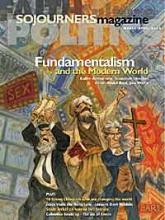Come to the Table Download in Word or PDF format (requires Acrobat Reader) for copy-ready versions with fewer pages, or click "print this article" button on right. Session I. Fundamentalism It's become an especially dirty word since Sept. 11, but does fundamentalism necessarily equal violence? As you read the article, consider the authors' contention that fundamentalist movements in Christianity, Judaism, and Islam have more in common than might appear. Questions to Consider 2. What does the cover art of this issue of Sojourners convey about fundamentalism?
Invite your friends, pass the cookies, and dig into Sojourners. Table Talk discussion guides provide a bi-weekly gathering place for communities to discuss issues of faith, politics, and culture--local and global. Table Talk offers a smorgasbord of questions (enough for four sessions, if you want to arrange it that way), as well as resources for further study and suggestions for action. You bring dessert.
"Fundamentalism and the Modern World" (p. 20)
1. Fundamentalism is defined as "usually a religious movement or point of view characterized by a return to fundamental principles, by rigid adherence to those principles, and often by intolerance of other views and opposition to secularism." How would you define fundamentalism? What strikes you as the characteristics of a fundamentalist worldview?
Read the Full Article
